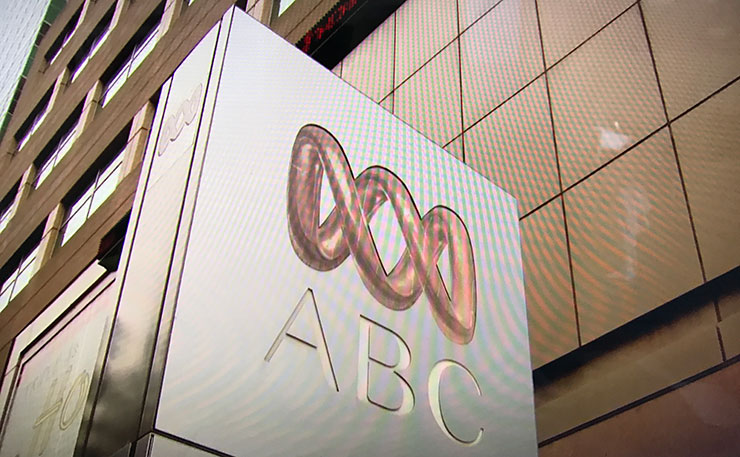The ABC’s Media Watch programme recently reported on a matter that threatens to have a serious impact on Australian documentary filmmakers. Media Watch host David Marr described how, at the start of this year, filmmaker Judy Rymer was denied access by the ABC to footage of Australian politicians for her documentary about asylum seekers, Punished Not Protected.
The reason for this refusal? Rymer’s proposed film was a ‘political statement’. As Marr commented wryly, ‘imagine that — a documentary maker wanting to make a political statement by using footage of a politician making a political statement.’ Rymer was told if she wanted to get access to the ABC news footage of politicians making statements about asylum seekers, she would need the consent of those politicians whose grabs she was planning to include in the film.
After Rymer was refused access without this kind of permission, the ABC changed its formal policy on access to archival footage. As of March 2004, clause 2.2 of the ABC Library Sales Terms and Conditions now reads as follows:
‘… if the licensed materials contain vision and/or sound of an identifiable individual and the Licensee intends to use the Licensed Material in a political advertisement, namely an advertisement authorised by a political party, and/or an advocacy or cause or related advertisement or program, the Licensee will obtain the individual’s prior permission for that use’.
The words ‘and/or an advocacy or cause or related advertisement or program’ have been added. The head of ABC Enterprises, Robyn Watts has been widely quoted denying that the policy has been changed, and claiming ‘the wording was merely clarified’. But this is more than just a ‘clarification’. It is a significant change from previous policy, and it has the potential to affect many documentaries made in Australia.
Why should a documentary maker be made to seek the consent of politicians before using comments that are already on the public record? As David Marr pointed out in Media Watch, the very idea that you would ask permission to use potentially embarrassing footage of the very people who you are planning to embarrass is ridiculous.
In a recent letter to ABC chairman Donald McDonald, the Australian Screen Directors’ Association noted:
‘Documentaries are commonly defined as the ‘creative treatment of reality’. In the majority of cases documentaries are in-depth stories which probe aspects of our society and culture. It is very likely that some of these stories might well be embedded in a highly political context. It is precisely these documentaries that risk having their request for stock footage rejected by ABC Corporate Services.’
Just consider some of Australia’s most recent documentary films – like Tom Zubrycki’s Molly and Mobarak (which deals with refugees) or Curtis Levy and Bentley Dean’s The President versus David Hicks (which examines the plight of Guantanamo Bay detainee David Hicks). It is not hard to see how the line between a documentary and an ‘advocacy or cause’ programme can be extremely blurred.
Robyn Watts argues that the new ‘clarified’ policy is about protecting the ABC’s editorial integrity over the footage that it generates and owns the rights for. As Marr pointed out on Media Watch, this is laughable:
‘We’ve been at this for a month now and we still can’t get anyone to tell us how requiring, say, Peter Reith’s OK to sell footage of himself, does anything but undermine the editorial integrity of the ABC.’
If the ABC is concerned about editorial integrity, it might consider a guideline that did not allow a person to be misrepresented (namely, for their words to be presented to say something that they did not say). However, to argue that inclusion of their public statements in a film that happens to be taking a particular political stance affects the integrity of that footage stretches all notions of common sense. As filmmaker Dennis O’Rourke commented at a recent Media Central public forum in Sydney focusing on this issue: ‘There is no editorial integrity involved if it is a public figure speaking publicly.’
This is particularly the case, given the shortness of the clips used by Judy Rymer. As media lawyer Roy Baker explained at Media Central, under the law’s ‘fair dealing’ provisions filmmakers can use short pieces of footage provided they acknowledge the copyright owners.
Robyn Watts has also argued that Judy Rymer’s case is an isolated occurrence. Yet Media Watch has already identified another recent instance where a filmmaker was denied access to footage. Many documentaries seem likely to come within the ‘advocacy or cause’ definition, which suggests a real prospect of similar refusals in the future. An insidious effect of the policy change, however, might be to stop makers of similarly ‘political’ documentaries going to the ABC for footage in the first place. Even more insidious might be the fact that Watts’ response does not appreciate that such a condition of use should never be invoked. Whether a denial of access to news footage occurs in this manner once a year or once every ten years, it is too often.
The Australian Screen Directors Association, along with other film bodies such as the Screen Producers Association, and associated bodies such as Friends of the ABC, will continue to campaign and lobby on this issue.
This is not a campaign against the ABC, but against a decision by ABC management. It’s about rectifying a mistake, and preserving the ABC as our national public broadcaster.
Every arts practitioner, every journalist, everyone who cares about the independence and integrity of our national debates should take an interest in this issue and let the ABC know of their concern.
Donate To New Matilda
New Matilda is a small, independent media outlet. We survive through reader contributions, and never losing a lawsuit. If you got something from this article, giving something back helps us to continue speaking truth to power. Every little bit counts.




